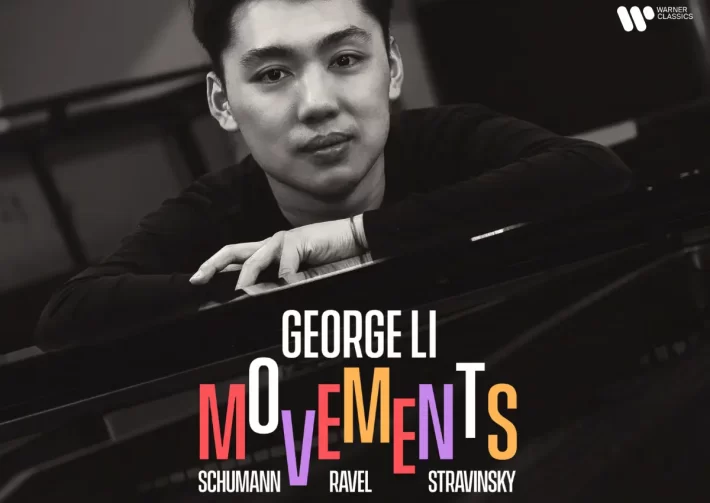Titled “Movements”, this ambitious program includes Schumann’s complete Davidsbündlertänze, Ravel’s Valses nobles et sentimentales, and Stravinsky’s three movements from Petrushka, arranged for the piano by the composer for pianist Arthur Rubinstein.
What Li does well in Schumann’s Davidsbündlertänze bringing out its simple, idealistic innocence, and so the Eusebius pieces are especially memorable. While the character of movements like the opening Lebhaft (track 2) naturally lend themselves to this sort of charm, Li’s crips staccatos and clean phrasing make all the difference in adding an infectious optimism. His rhythmic consistency of Innig (track 3) avoids the trap of becoming metronomic, yet maintains the melodic line’s fluidity. When the music calls for it on the Florestan movements, Li is not afraid to take a more forward approach: No. 10 (track 11) boasts a solid lower register as an anchor of sound, though some may prefer more storminess, urgency, and variety elsewhere; Stephen Hough’s recording for Erato not only has a more pointed theme, but also greater differences of personalities between the two antagonists.
Next up are Ravel’s Valses nobles et sentimentales, where Li demonstrates his best playing. I liked how he manages to make the character of individual Valses stand out, while still highlighting similarities in each. The off-kilter playfulness of the first valse (track 20), for example, is nicely offset by the contemplative lyricism of the second; at the same time, Li leans into Ravel’s poignant dissonances as a sort of reminder of the quirkiness we heard prior. The coquettish chimes of the high notes in the third valse (track 22) are nicely complemented by the velvety and mellow middle and lower voices; Li then creates a seamless segue into the Fourth by way of these chimes. In the way he unfolds the subsequent music, we hear how this new valse’s swinging lull takes over.
Li gives the enigma of No. 5 a lighthearted sheen. And though No. 6 doesn’t deviate all that much in terms of personality, it’s nice to hear how he takes full advantage of the small leaps to create extra bursts of energy. In some ways, the penultimate valse (track 26) is the most dynamic for its extreme shifts in moods, and Li does fine work in capturing the unexpected transitions between them.
Stravinsky’s Three Movements from Petroushka are the most difficult piece here technically, and rounds out this program Unfortunately, it’s not as an effective finale as I’d hoped. The Russian Dance (track 28) certainly has boldness, but a major issue is the voicing of the chords, which makes it difficult to hear the central melody. The rather forceful attack on the keys creates more of a bangy than a resplendent tone. And while Li makes concerted efforts to shift the character in the delicate middle section (1’01”) the music still scintillates too harshly. Out of few recent versions, a fine recording by Haochen Zhang (Harmonia Mundi) might be on the more nuanced side, but captures exquisitely the energy, sprightliness, elegance—and most importantly, the ballet spirit—of Stravinsky’s writing.
Join The Classical Newsletter
Get weekly updates from The Classic Review delivered straight to your inbox.
Petroushka’s Room (track 29), suffers from a similar stringency of sound, but ultimately does better. Perhaps this is because Li establishes better contrasts between the loud and soft sections. The juxtaposition of these extremes helps bring a sense of terror to the intense moments, while the interludes are tinged with suspense and unease.
With the exception of the Stravinsky, Li demonstrates a polished familiarity and facility with the repertoire. While the interpretations may not be the most vibrant out there, they still capture the essence and spirit of each composer—an enjoyable listen, especially for the Schumann and Ravel.

Recommended Comparisons:
Ravel: Hough | Volodos | Rubinstein | Chamayou
Schumann: Perahia | Uchida | Poon | Giltburg
Stravinsky: Pollini | Wang | Rana | Kempf
“Movements”
Schumann – Davidsbündlertänze
Ravel – Valses nobles et sentimentales
Stravinsky – Three movements from Petrushka

Check offers of this album on Amazon Music.
Album Details |
|
|---|---|
| Album name | Movements |
| Label | Warner Classics |
| Catalogue No. | 5419789314 |
| Amazon Music link | Stream here |
| Apple Music link | Stream here |

















